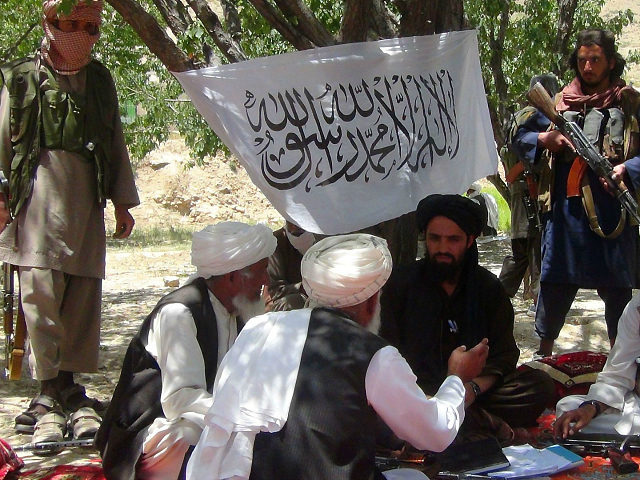A meeting in Qatar last week between a senior U.S. diplomat and representatives of the Taliban reportedly went well last week, gaining an endorsement from the unity government of Afghanistan on Sunday.
The precise nature of the meeting is officially ambiguous. According to Taliban officials, an American diplomat met with Taliban representatives in Doha without officials from the Afghan government present — an unprecedented level of contact with the Taliban that would run counter to longstanding U.S. policy.
The New York Times reported on Saturday that the State Department insisted “any negotiations over the political future of Afghanistan will be between the Taliban and the Afghan government” but did not deny the meeting in Doha took place.
According to the Times, the senior U.S. diplomat at the meeting was Alice Wells, former ambassador to Jordan and current assistant secretary for South and Central Asian Affairs. The Taliban claims there were several other American diplomats who were not named by sources.
The State Department confirmed that Wells was in Qatar last week but would only say that she discussed the situation in Afghanistan with officials from the United Arab Emirates.
Taliban sources told the BBC that Wells wanted Afghan officials to be present at the meeting in Doha but the Taliban refused.
As the State Department indicated in its statement on Saturday, U.S. policy has long insisted that the Taliban must negotiate only with the unity government in Kabul, while the terrorist group is equally insistent that it must be able to deal directly with the United States as long as American troops are operating in Afghanistan. The Trump administration decided in July to jump-start negotiations with the Taliban by authorizing U.S. diplomats to speak with them directly.
“Afghan government officials remain concerned that the U.S. could appear desperate for a peace settlement, allowing the Taliban to squeeze concessions from a superpower fatigued with a grinding war that has settled into a stalemate,” NBC News reported on Monday.
A similar effort to get peace talks moving in 2015 — again with Qatar as the middleman because the Taliban maintains diplomatic offices there — collapsed due to objections from the Afghan government. Kabul seems much more supportive this time around. NBC quoted both foreign diplomats and former U.S. officials who said the Taliban appears more receptive to negotiations than before, due in part to greater support for the Kabul government from other Muslim countries.
A spokesman for President Ashraf Ghani said on Saturday that “help and support from any side that can facilitate the peace process” are welcome. Abdullah Abdullah, chief executive of the Unity Government, endorsed talks between the U.S. and the Taliban on Sunday.
Virtually all information about the meeting in Doha is coming from Taliban sources at the moment. One official said the talks were held in a “very cordial atmosphere” and both sides offered “useful exchanges.” Another described a “friendly atmosphere” and said the meeting produced “very positive signals.”
These sources said the major demand made by American representatives at the meeting was preserving U.S. military bases in Afghanistan. They also claim two previous direct meetings with lower-level U.S. officials have been held previously, and more serious discussions of subjects such as a prisoner exchange could be coming up next.
“We have held three meetings with the U.S. and we reached a conclusion to continue talks for meaningful negotiations. However, our delegation made it clear to them that peace can only be restored to Afghanistan when all foreign forces are withdrawn,” one Taliban official told Reuters on Sunday.
A surprisingly successful three-day truce during the Muslim holiday of Eid al-Fitr last month was taken as an encouraging sign that the 17-year-old civil war might finally be brought to an end. A long-term ceasefire to begin on the upcoming Eid-ul Adha holiday in late August was reportedly proposed by the American delegation in Doha.

COMMENTS
Please let us know if you're having issues with commenting.